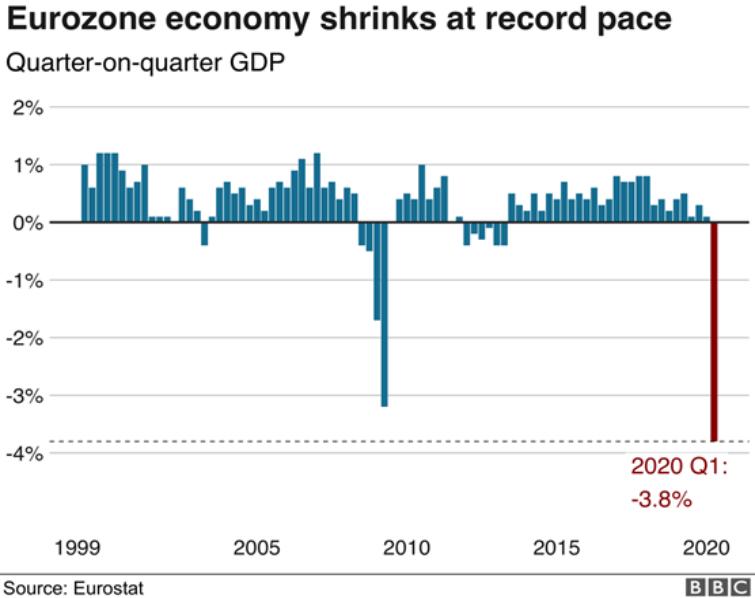An Unexpected Blow To The ECB (Part II) – Analysis
The corona effect
Although the German court ruling had nothing to do with this latest wave of easing and money printing triggered by the coronavirus crisis, the timing of it puts the present situation in a different perspective.
This crisis has served as a “judgment day” of sorts. It revealed the countless failures, the incompetence and the disarray at the very core of most institutions, not just in Europe, but globally. The more decentralized nations did fare relatively better than those with a high degree of centralization, the latter unfortunately being the majority. There, the lack of consistency and of clear leadership, the contradictory messages, the failures of public healthcare that cost countless lives, the political decisions that cost millions their jobs and livelihoods, all exposed the defects of centralization and the unreliability of both national governments and international organizations. And that’s just the first wave of disasters, the ones immediately seen and felt. There are even more grave consequences and after-effects in the pipeline, which most citizens haven’t even realized yet, such as the inevitable breakdown of welfare systems and the debt time-bombs in most major economies.
Specifically in the EU, the moral shortcomings, the small-time power games, the hypocrisy and the sheer panic of the bloc’s leadership were laid bare for all to see. All that talk of friendship and cooperation between European nations, all these speeches about “solidarity” and the great European family, instantly proved shallow when this perfect Union was confronted with the covid threat. Shipments of medical supplies destined for one nation were seized in transit by their neighbor, drugs were hoarded, borders were shut, trade was frozen. The first and hardest hit member of the “family” went unaided and helpless for weeks. The first EU rescue package, meant to help keep the economy alive in the face of the forced shutdown, was delayed by political horse-trading, all while entire industries were decimated and millions rendered unemployed.
The scale of the economic disaster is only now starting to become clear and the future looks bleak, even without all the risks being understood and accounted for yet. The deterioration and the economic downturn that is just beginning is projected to be comparable or possibly worse than the Great Depression, and it could last longer too. Already the Eurozone economy saw the steepest decline in its history, according to Eurostat figures, while the unfolding recession is projected to be much worse than the last crisis. The “cures” that worked before are unlikely to stop this tsunami, while the unprecedented levels of spending we now see in most member states are not sustainable. The “emergency checks” and worker protections cannot stick around forever. Not unless they are formalized and normalized as we saw in Spain, where a basic income scheme is being introduced, the first ever in Europe, which the Spanish government hopes will indeed “stay forever”. This of course is no “solution”, but simply the nationalization of the economy. Central planning, income redistribution and the state takeover of the private sector, are all at the core of various “rescue” efforts and ideas being pushed at the moment and we know where this road actually leads. If the countless historical examples aren’t enough to demonstrate the inevitable and inescapable results of these policies, one only need look at contemporary China.

Still, the economic pain is already so widespread that demonstrations and new movements are starting to have an impact. Anti-lockdown protests, rent strikes, clashes with police, have all been increasingly frequent in many European capitals. The political winds are also shifting, and once again, public sentiment is turning decisively against the EU. According to a recent survey by Tecné, 42% of Italians said they would leave the EU, up from 26% in November 2018, while 88% felt the EU failed to support their country. Over in France, around six out of ten people “do no not trust” Brussels, according to a Jacques Delors Institute’s study.
Therefore, this idea of nations taking back control of their economy couldn’t have come at a worse time for the EU and those who see an opportunity in the corona crisis to push for further centralization. Support for measures that would lead to tighter integration and even more power handed to Brussels is high among institutional figures, however, these plans are very unlikely to be popular among citizens.
Although the North-South economic divide has grown exponentially deeper in just a few months, the corona crisis has arguably managed to bridge political gaps. Citizens of the hard-hit South, especially in countries like Italy and Spain, have become markedly more mistrustful and disillusioned with the EU and turn away from it, as they feel it turned away from them, in their hour of need. On the other hand, citizens of the more prosperous North, see exactly how this “rescue” effort is going to end, as it did a thousand times before, with them having to foot the bill to support Southern economies that were already failing long before the coronavirus ever made it out of Wuhan.
What lies ahead
Overall, it is unlikely that the legal challenge from the German court will make a practical difference in the unlimited QE plans of the ECB. Especially at a time like this, money flooding the markets and negative interest rates are simply a fact of life and there is no conceivable way for the ECB to just stop, the same way it is impossible for governments to reverse course in their massive spending sprees anytime soon. The scale of the damage that was done to the economy, the destruction of any kind of private productivity, the job killing shutdowns and the desperation among officials to plug the holes of a sinking ship, all render these measures necessary, both politically and realistically.
What the ruling might achieve, however, is not a monetary change, but a political one. It could serve as a signal that national sovereignty is a matter that is still on the table, still worth debating and defending. In this regard, we do seem to be approaching a crossroads and there’s a choice to be made.
We either passively accept a centralized future, where the individual becomes irrelevant, valueless and expendable, or we reclaim control, through the principles of subsidiarity, where decisions are made on the lowest possible level and all voices are heard. In the aftermath of the corona crisis, the latter option already seems to be gaining momentum, and understandably so. After so many were let down, betrayed and ignored, after basic rights were trampled and after the promise of security in exchange for freedom proved to be a very bad deal indeed, it is no wonder that alternatives are sorely needed and that a hard turn towards individual responsibility, independent thought and decentralization is already underway.

